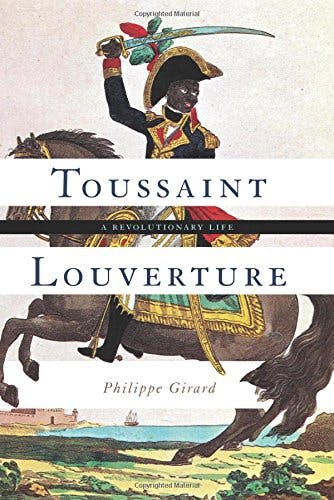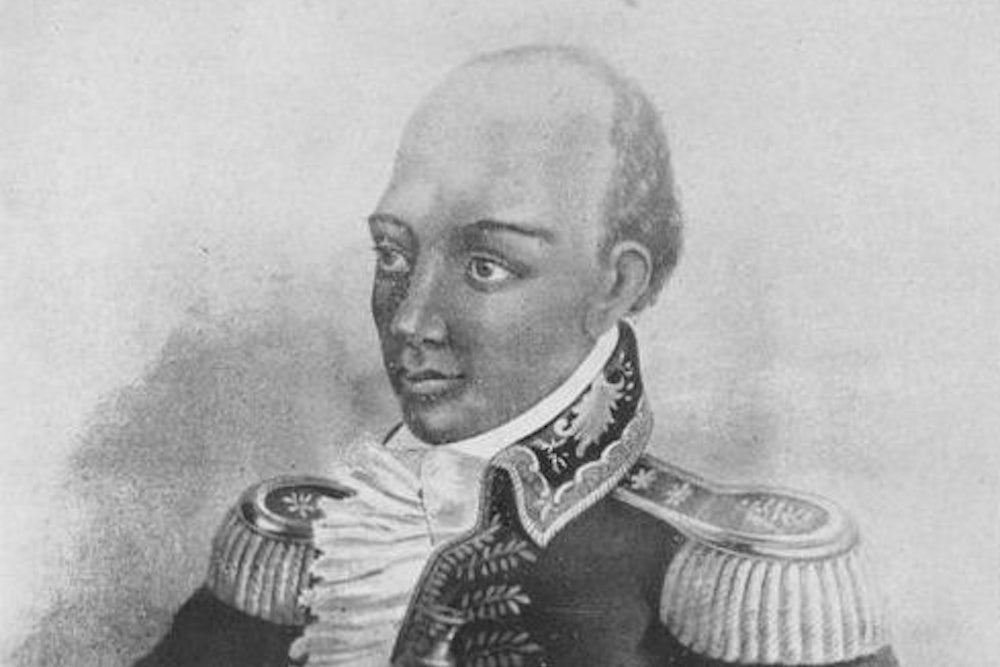For nearly 80 years no scholar has written an English-language biography of Haitian revolutionary Toussaint Louverture. This fact is even more remarkable when you consider Louverture’s contemporary equals: a group so small it may not extend beyond Napoleon Bonaparte and George Washington. He was born a slave and became a world leader; even in his own time biographers reached back to the Romans, to Spartacus, for a comparison. Louverture is a unique figure in the modern era, and yet he has had some trouble getting due credit.

Philippe Girard, a professor of history at Louisiana’s McNeese State University, steps into the gap. His book Toussaint Louverture: A Revolutionary Life is the kind of book you might think already exists. It’s a straightforward biography of one of the Age of Enlightenment’s Great Men, a designation that Louverture pursued and one that always seemed to elude him in important ways. Why that was does not confuse us now, and it did not confuse him then: “If I were white I would receive only praise,” Louverture lamented of his place in world politics, “But I actually deserve even more as a black man.” In an era when rebels and usurpers became statesmen and landowners, it was an obvious injustice that he and only he could be excluded.
Unlike America, Saint-Domingue (the French slice of Hispaniola) was not a slave-breeding economy. The colony relied on importation, and the small territory received as many captives as the whole of the United States. The demand transformed slaving practices in the coastal territories of west Africa, and Louverture’s father was a victim. An aristocrat of the Allada kingdom (not quite the son of a king as had been legend, Girard concludes) he was captured and sold for 300 pounds of cowrie shells around 1740. We know him by the name he was given in enslavement and baptism: Hippolyte.
Louverture was born in the city of Cap on the Bréda plantation. The Brédas were absentee landlords, as was common in Saint Domingue, a system that for slaves worked out for the better and worse. Plantation managers acted with independence (though they were held to account for killed or damaged slaves); the Bréda overseer Bayon de Libertat seems to have exercised that freedom mostly for embezzlement. Eager to distinguish himself, young Louverture had shown extraordinary capacity with horses and mules and became de Libertat’s favorite. De Libertat had him drive his coach, then he seems to have freed him under ambiguous circumstances. The slaves were not de Libertat’s to free, and for him to release Toussaint informally would have been another act of embezzlement.
For most of his life there was nothing particularly revolutionary about Toussaint (“Louverture” would come later). Girard points out that he was, on the other hand, exceptionally adept at navigating the slave system. The chance of being manumitted during a slave’s lifetime were under one percent, and in the colorist system these were mostly the mothers of mixed-race children. Men made up less than 11 percent of freed slaves. So Toussaint, Girard writes, “won the lottery.” While there were early slave rebellions on Saint Domingue, Toussaint does not seem to have been involved. His devout Catholicism—so devout, in fact, that Girard suggests at times he stepped over the line and performed mass as a layman—distanced him from insurrections that drew inspiration from Vodou.
Once he managed the huge feat of obtaining his own freedom, Toussaint set about freeing his family. Here is the hard crux of Girard’s account: To free slaves required money, and money on Saint Domingue required slaves. As a free man, Toussaint leased a coffee estate from his son-in-law, including the slaves. True success navigating the slave system meant joining the other side. The revelation that the “Black Spartacus” drove slaves spurred some modern historians to over-correct, speculating that Toussaint was a well-heeled bourgeois by the time of the revolution. But his position was more precarious. The coffee estate failed, and a slave register unearthed in 2013 records his tragic next move: Toussaint resumed his place on the Bréda plantation.
Meanwhile, revolution was in the air, but not the kind that might inspire slaves. By the 1780s abolitionists were gaining influence and they started getting through to French King Louis XVI, who signed an ordinance allowing slaves to appeal to public officials if they were subject to extreme cruelty, which worried the Saint Domingue planters. In revolution, they saw an alternative: “The example set by the victorious American rebels suggested that it was possible to gain political autonomy,” Girard writes, “while maintaining racial inequality.” The American Revolution taught the white and creole colonists that bourgeois liberty could coexist with slavery just fine.
In 1791 when the Haitian Revolution truly began it was in the name of King Louis. The slaves of Saint Domingue believed (and not without good reason) that the King was their best shot for labor reform, and in the planning stages Toussaint implied that the insurrection against the restless colonists was authorized at the royal level. The end of slavery was not yet on their agenda; Toussaint spread word that the King had promised three-day weekends. When news of the French Revolution reached the colony, Toussaint’s comrade in arms Georges Biassou declared himself Viceroy in the name of the Bourbons and promoted Toussaint to general of the royal army-in-exile. For a short time the rebel army (though, fighting for the deposed King, they hated to be called that) even joined the Spanish colonial forces rather than the French republicans, who by then were courting Toussaint.
It took a familiar character to clarify Toussaint’s historical purpose: the white savior. Not yet 30 years old, Léger-Félicité Sonthonax had two mandates when appointed Commissioner of Saint Domingue by the French Republic: to re-establish French control and figure out how to reconcile slavery with revolutionary ideas of human equality. The abolitionist—and in Girard’s account, genuinely anti-racist—Sonthonax purged the colonial government, assumed virtually dictatorial power, abolished slavery, then sent a delegation back to France to let them know. Although Toussaint decided to rejoin the French side around this time, Girard’s evidence suggests it was not admiration for Sonthonax that convinced him. He “saw the slave rebellion that he had midwifed slip out of his control,” Girard writes, “as Sonthonax became the embodiment of black liberty.” This is when Toussaint introduced himself through a series of open letters as the slave rebel in charge, as well as when he took the name Louverture—“the opening”—to remind everyone who was behind this whole abolition thing.
Sonthonax was recalled to France to answer for his slavery-abolishing impertinence in 1793, and was replaced by Etienne Laveaux. By the time Sonthonax returned three years later, Louverture was commander-in-chief of the Saint Domingue armed forces, he had vanquished the Spanish, outmaneuvered the planter class, and was on his way to kicking out the British too. But with Sonthonax eager to cement his place as the island’s white savior, Louverture was spurred to act. In a series of deft moves he had Laveaux elected to represent the colony in the Parisian Chamber of Deputies, and then, with his soldiers holding key positions, encouraged Sonthonax to head back to France, which he did. Louverture finally controlled the colony.
This is the point in the narrative when Girard’s critical angle gets some teeth. In the war years, Louverture had not only wrested control from the colonial administrators but had also become the whole island’s richest man. He became the wealthiest planter at the very moment when the plantation system’s foundation had crumbled. Without slavery—or something like it—it simply could not function, and Louverture was suddenly invested in its continued functioning. Rather than taking his army and, say, conquering the United States (as one French plan suggested), Louverture defended a forced labor system from both sides: against what was left of the Creole planters and worker revolts. He banned the sale of small parcels of land in order to restrict subsistence farming, then instituted lifetime serfdom. “In France, everyone is free but everyone works,” Louverture said by way of justification. In 1801, he formally restored the slave trade.
As Louverture seemed to know, he was a better bourgeois ruler than his contemporaries. He was Abraham Lincoln and George Washington combined, emancipation and independence in quick succession. He played the middle, between visions of universal freedom and the exigencies of a class system. In Girard’s telling, what he wanted more than anything, was the recognition and respect due to a man of his accomplishments. As a black man and former slave, he never got it. He repeatedly rescued imperiled whites, as if the noblesse would follow from the oblige. When Thomas Jefferson—a slaveholder and bigot—was elected in the US, he sought to isolate Louverture economically and diplomatically. “I wrote several letters to you already,” Louverture wrote Napoleon in 1800, “and I never received a response from you.” Napoleon was able to capture, expatriate, and jail Louverture in France, where he died in 1803. The revolution continued without him, but Haiti’s independence was never Louverture’s priority.
A book like Girard’s might have been near the top of Louverture’s list. For a man born a slave to star in his own biography centuries later, not as a slave, but as a leader and a statesman is an accomplishment without match. He was, as Girard says, “a man of his time,” a phrase that excuses the half-measures of great men. Perhaps the most accurate thing to say is that Toussaint Louverture was merely a Great Man.
